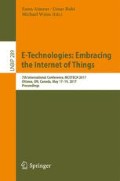Abstract
Massive Open Online Courses (MOOCs) are a new shaking development in higher education. They combine openness and scalability in a most energetic way. They have the capacity to broaden participation in higher education. In this way, they help to achieve social inclusion, the dissemination of knowledge and pedagogical innovation and also the internationalization of higher education institutions. However, one of the most essential elements for a massive open language learning experience to be efficient is to enhance learners and to facilitate networked learning experiences. In fact, MOOCs are meant to serve an undefined number of participants, thus serving a high heterogeneity of profiles, with various learning styles and schemata, and also contexts of contribution and diversity of online platforms. Personalization can play a primary role in this process. Accordingly, adaptive MOOCs use adaptive techniques so as to present personalized learning experiences, having as basis dynamic assessment and data collecting on the course. They count on networks of prerequisites and deal with learners according to their different personalized paths through the content. This has been described by the Gates Foundation as an essential novelty in the area for large-scale productivity in online courses. Analytics are also to be credited with bringing about change and improvement of the course in the future. This paper looks into the MOOCs system by reviewing the available literature, spotting the various limitations of traditional MOOC system and suggesting a proposed framework for adaptive MOOCs based on hybrid techniques. By so doing, we generate suggestions of learning paths adapted to the competences profile of each participant with a focus on objectives, such as reducing the rate of dropout and improving MOOCs quality.
Access this chapter
Tax calculation will be finalised at checkout
Purchases are for personal use only
References
Siemens, G.: Massive Open Online Courses: Innovation in education? In: Open Educational Resources: Innovation, Research and Practice, p. 5 (2013)
State of the MOOC 2016: A Year of Massive Landscape Change For Massive Open Online Courses. http://www.onlinecoursereport.com/state-of-the-mooc-2016-a-year-of-massive-landscape-change-for-massive-open-online-courses/
Petkovska, B., Delipetrev, B.J., Zdravev, Z.: MOOCS in higher education – state of the art review. In: ITRO 2014
Yousef, A.M.F., Chatti, M.A., Schroeder, U., Wosnitza, M., Jakobs, H.: A review of the state-of-the-art. In: Proceedings of the 6th International Conference on Computer Supported Education, CSEDU 2014, pp. 9–20 (2014)
MOOCs and Open Education Timeline (updated!). http://blogs.cetis.org.uk/cetisli/
Thakkar, S.R., Joshi, H.D.: E-learning systems: a review. In: 2015 IEEE Seventh International Conference on Technology for Education (T4E), pp. 37–40 (2015). doi:10.1109/T4E.2015.6
Brusilovsky, P., Nejdl, W.: Adaptive hypermedia and adaptive web. In: Miscellaneous 2004.http://www.kbs.uni-hannover.de/Arbeiten/Publikationen/2003/brusilovsky-nejdl.pdf
Daradoumis, T., Bassi, R., Xhafa, F., Caballé, S.: A review on massive e-learning (MOOC) design, delivery and assessment. In: Proceedings of the 2013 8th International Conference on P2P, Parallel, Grid, Cloud and Internet Computing, 3PGCIC 2013, pp. 208–213 (2013). doi:10.1109/3PGCIC.2013.37
Bassi, R., Daradoumis, T., Xhafa, F., Caballé, S., Sula, A.: Software agents in large scale open e-learning: a critical component for the future of massive online courses (MOOCs). In: Proceedings of the 2014 International Conference on Intelligent Networking and Collaborative Systems, INCoS 2014, pp. 184–188. IEEE (2014). doi:10.1109/INCoS.2014.15
Lerís, D., Sein-Echaluce, M.L., Hernandez, M., Bueno, C.: Validation of indicators for implementing an adaptive platform for MOOCs. In: Computers in Human Behavior (2016). doi:10.1016/j.chb.2016.07.054
Sonwalkar, N.: The first adaptive mooc: a case study on pedagogy framework and scalable cloud architecture-part I. In: MOOCs Forum, pp. 22–29 (2013). doi:10.1089/mooc.2013.0007
Onah, D.F.O., Sinclair, J.E.: Massive open online courses – an adaptive learning framework. In: The University of Warwick, INTED 2015, pp. 1258–1266. doi:10.13140/RG.2.1.4237.0083
Teixeira, A., Mota, J., García-Cabot, A., García-Lopéz, E., De-Marcos, L.: A new competence-based approach for personalizing MOOCs in a mobile collaborative and networked environment. In: Revista Iberoamericana de Educación a Distancia, vol 19, pp. 143–160 (2016). doi:10.5944/ried.19.1.14578
Milićević, A.K., Vesin, B., Ivanović, M.: Integration of recommendations and adaptive hypermedia into Java tutoring system. doi:10.2298/CSIS090608021K
Kidziński, Ł., Giannakos, M., Sampson, D.G., Dillenbourg, P.: A tutorial on machine learning in educational science. In: Li, Y., et al. (eds.) State-of-the-Art and Future Directions of Smart Learning. Lecture Notes in Educational Technology, pp. 453–459. Springer, Singapore (2015)
Chrysafiadi, K., Virvou, M.: Fuzzy Logic in Student Modeling. In: Bra, Paul M.E., Chrysafiadi, K., Virvou, M. (eds.) Advances in Personalized Web-Based Education. Intelligent Systems Reference Library, vol. 78, pp. 25–60. Springer International Publishing, Cham (2015)
Frías-Martínez, E., Magoulas, G., Chen, S., Macredie, R.: Recent soft computing approaches to user modeling in adaptive hypermedia. In: Bra, Paul M.E., Nejdl, W. (eds.) AH 2004. LNCS, vol. 3137, pp. 104–114. Springer, Heidelberg (2004). doi:10.1007/978-3-540-27780-4_14
Chrysafiadi, K., Virvou, M.: Student modeling approaches: a literature review for the last decade. In: Expert Systems with Applications, vol. 40, pp. 4715–4729. Elsevier Ltd. (2013). doi:10.1016/j.eswa.2013.02.007
Sikka, R., Dhankhar, A., Rana, C.: A survey paper on e-learning recommender system. Int. J. Comput. Appl. 47, 27–30 (2012). doi:10.5120/7218-0024
Onah, D.F.O., Sinclair, J.E.: Collaborative filtering recommendation system: a framework in massive open online courses, pp. 1249–1257 (2015)
Vesin, B., Klašnja-Milićević, A., Ivanović, M., Budimac, Z.: Applying recommender systems and adaptive hypermedia for e-learning personalization. In: Computing and Informatics, vol. 32, pp. 629–659 (2013)
Hammouda, K.: Collaborative document clustering. In: Sixth SIAM International Conference on Data Mining, pp. 451–461 (2006)
Schafer, J.B.: The application of data-mining to recommender systems. In: Encyclopedia of Data Warehousing and Mining, pp. 44–48 (2009)
Krištofič, A.: Recommender system for adaptive hypermedia applications. In: Student Research Conference, IIT. SRC 2005 pp. 229–234 (2005). http://www.fiit.stuba.sk/iit-src/2005/zbornik.pdf#page=243
Author information
Authors and Affiliations
Corresponding author
Editor information
Editors and Affiliations
Rights and permissions
Copyright information
© 2017 Springer International Publishing AG
About this paper
Cite this paper
Ardchir, S., Talhaoui, M.A., Azzouazi, M. (2017). Towards an Adaptive Learning Framework for MOOCs. In: Aïmeur, E., Ruhi, U., Weiss, M. (eds) E-Technologies: Embracing the Internet of Things . MCETECH 2017. Lecture Notes in Business Information Processing, vol 289. Springer, Cham. https://doi.org/10.1007/978-3-319-59041-7_15
Download citation
DOI: https://doi.org/10.1007/978-3-319-59041-7_15
Published:
Publisher Name: Springer, Cham
Print ISBN: 978-3-319-59040-0
Online ISBN: 978-3-319-59041-7
eBook Packages: Computer ScienceComputer Science (R0)

